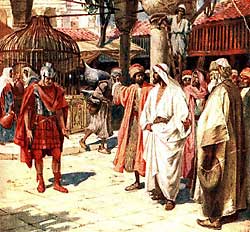Page 291 … Jesus & John 5:29
You then quote John 5:29, though I’m not sure why, as it pretty clearly supports my interpretative model in this discussion … Consider: “And those will come out—those who have done good to the resurrection of life; and those who have done evil to the resurrection of condemnation … Very truly, I tell you, whoever believes has eternal life … Whoever believes in me, will DO the works I do.” ~ Jesus Christ (John 5:29 + John 6:47 + John 14:12) … And as such, here we are called to consider that oh-so-important question: “What would Jesus do?” … What would Jesus do when confronted by a homosexual, Lucy? Well, we actually find evidence in the Bible where he did come face to face with at least one homosexual. And what did Jesus do when he did so? He extended that homosexual compassion and rewarded his faith – all without mentioning his “sin” at all! Again, please consider the Word of God:
“When he entered Capernaum, a centurion came to Jesus, appealing to him and saying, ‘Lord, my servant* is lying at home paralyzed, in terrible distress.’ And Jesus said to him, ‘I will come and cure him.’ And the centurion answered, ‘Lord, I am not worthy to have you come under my roof; but only speak the word, and my servant will be healed. For I also am a man under authority, with soldiers under me; and I say to one, “Go” and he goes, and to another, “Come” and he comes, and to my slave, “Do this” and it is done.’ When Jesus heard this, he was amazed and said to those who followed him, ‘Truly I tell you, in no one in Israel have I found such faith. I tell you, many will come from east and west and will eat with Abraham and Isaac and Jacob in the Kingdom of Heaven, while the heirs of the Kingdom will be thrown into the outer darkness, where there will be weeping and gnashing of teeth.’ And to the centurion Jesus said, ‘Go; let it be done for you according to your faith.’ And the servant* was healed in that very hour.” ~ Matthew 8:5-13
*NOTE: The Greek word translated as “servant” in this passage was not the more typical doulos (Strong’s #1401 = “slave”) or diakonos (Strong’s #1249 = “attendant”), but rather “Pais” (Strong’s #3816), a term often used to refer to a man’s younger same-sex lover. As it turns out, the mirror passage of this tale (Luke 7:1-10) uses the Greek term entimos doulos, making it clear that the “servant” in question was A) not the son of the centurion and B) an “honored” servant of special status and high regard. Also, in Matthew 8:9, the centurion does not use the word “Pais” to refer to his other slaves, implying that the servant in question in the overall passage has a special relationship with him. Finally, it is important to note the historical fact that the Roman Emperor Augustus had instituted a ban on heterosexual marriage for Roman soldiers since before the birth of Christ; a ban which lasted until AD 197, and a ban which almost certainly inspired more than a few homosexual centurions to come at least partially out of the closet with their same-sex partnerships.





 ;
;